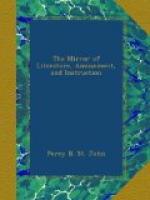“In the House of Commons, the Speaker never speaks to any question, except the House be in a committee; nor does he even vote, unless the number of votes on both sides of the House be equal; when his casting vote decides the majority. In the Lords, if the Chancellor be desirous of giving his opinion, he must leave the woolsack, and go to his place among that rank of nobility to which he belongs. If he be not a peer, he may neither speak to the question, nor vote upon it; but if a peer, he has a vote on every question. The Speaker of the Commons is prohibited by the rules of that House from persuading or dissuading the members in the passing of any bill: his duty is merely to make a plain and short narrative of its objects. When any member of the Commons is desirous of speaking on a bill before the House, he stands up in his place; uncovered, and directs his speech to the Speaker. In the House of Peers, on the contrary, the orator addresses himself to the Lords generally, only. In either case he may remain on his legs for an indefinite length of time: using whatever arguments, and entering into as many details, as he pleases; but, having once sat down, he is not permitted, unless personally reflected on, to speak again on the same day, to the same matter; or on the same reading of the same bill, even although his arguments be confuted by another member: but, if the whole house should be turned into a committee on any business, then any member may reply as often as he pleases, or as the chairman of the said committee may judge expedient. If it happen that any member of either House should utter words offensive to the King’s majesty, or to the House itself, he is immediately called to the bar: in the House of Commons he sometimes, on his knees, receives a reprimand from the Speaker, and is obliged to apologize: if the offence be great, he may, by the Speaker’s warrant, be sent to the Tower, or even to Newgate. When a member, during the heat of debate, happens to be betrayed into intemperate language towards another member he is merely called to ‘Order’ by the Speaker, and this call has generally the desired effect of quelling all animosity between the parties; but if, as sometimes has happened, anything should be uttered amounting to a challenge to settle the dispute ‘out of doors,’ the Speaker invariably insists upon a pledge from both, ’upon their honour,’ that there shall be no fight, and generally succeeds in making them shake hands; otherwise, he has it in his power to commit the would-be combatants to the safe-keeping of the sergeant-at-arms, and to bind the mover to keep the peace. If any member, notwithstanding the call to ‘Order,’ persist in being disorderly, it is customary for the Speaker to name him; by which indication he is sure to incur the displeasure or censure of the House.”




